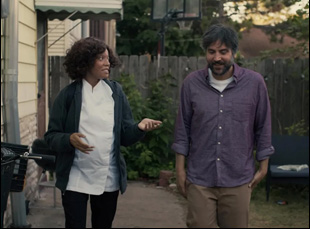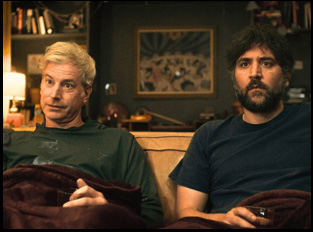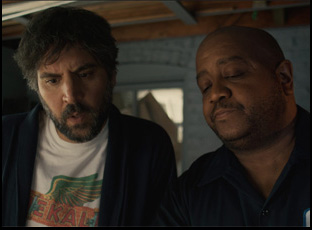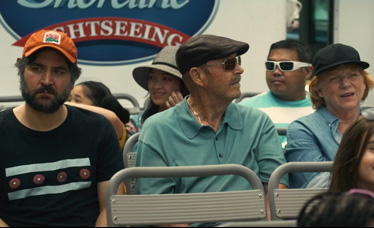As an artist who first came up as a musician before discovering she had a talent for filmmaking as well, Haroula Rose didn’t do herself any favors on her first feature, going out of her way to challenge herself with an ambitious adaptation of Bonnie Jo Campbell’s harrowing coming-of-age novel “Once Upon a River” set in the 1970s where in getting the reaction she wanted — of silence you could pierce with a pin drop —was the opposite of the response she’d have to a concert. The world didn’t help when the film, which premiered at her hometown Chicago Film Festival in the fall of 2019, was in the midst of setting up its full-fledged theatrical release when the pandemic hit, making it impossible to see audiences connect with it at all. This wasn’t necessarily why Rose made a comedy for her second feature “All Happy Families” where the response could be heard immediately, but it’s been a very nice side effect.
“It feels good to hear people laugh, especially after all this time where we couldn’t go to the theater or it was like people were trickling back,” says Rose. “I feel so lucky that it’s been at all these festivals and I’ve gotten to experience it in different regions of the country, and even at unexpected moments — usually with John Ashton, who is just pitch perfect and his relationship with Becky [Ann Baker], they just really feel so lived in and they get a lot of laughs, and it’s just been really cool to see that people laugh a lot.”
Speaking a few days before the unexpected passing of Ashton, who made himself available to up-and-coming filmmakers in the Midwest after becoming one of Hollywood great character actors in such films as “Beverly Hills Cop” and “Midnight Run,” Rose was marveling at the generosity of her cast and crew as a reason why audiences have responded so warmly in return, but the director should give herself more than a little credit as well with the disarming portrait of the Landrys, reunited when the duplex they own in Chicago and has been tended to by their youngest son Graham (Josh Radnor) needs some renovation before a new tenant (Chandra Russell) can move in. The poor plumbing situation, however, is indicative of the issues roiling underneath the surface when Graham’s parents Sue (Becky Ann Baker) and Roy (John Ashton) show up to help clean up, joined not long after by Will (Rob Huebel), the more successful of their two sons who is a regular on a major TV show.
The gathering should be an occasion for celebration when Sue has just retired and Will rarely can get back from the West Coast to the Windy City, but instead it stirs up long-simmering resentments when Sue tires of making up for the shortcomings of the men in her family, which are on full display when Will’s reason for returning back home involves misconduct on the set of his show, Graham can’t seem to pull himself out of a funk when comparing himself to his brother’s success as an actor and Roy’s lack of awareness towards anyone becomes acutely apparent after his granddaughter has transitioned and he can’t be bothered to remember. Still, the fun in “All Happy Families” is in seeing the beautifully orchestrated chaos that Rose and co-writer Coburn Goss find the grace notes as those in the family that have long put themselves first start to see their roles a little differently as others come to the fore, having no less than the great Rodney Crowell shows up at a club to welcome Sue up on stage when she might be feeling she’s at her lowest.
Rose’s musical background shows up in other ways beyond being able to pull in Crowell for a cameo, seemingly naturally attuned to comic rhythms while showing the tenderness that made her debut feature so impressive and “All Happy Families” may have a deceptive title, but feels true in so many other ways. With the film now in theaters, Rose graciously took the time to talk about how she moved between genres, how she developed an ear for dialogue and knowing the actors who could speak it, and the highs and lows of filming during a balmy summer in Chicago.

Yeah, “Once Upon a River” had its many challenges, but I have always wanted to do a comedy, and there’s threads of comedic things going on in “Once Upon a River,” even though it’s definitely a tragedy, but it was really nice to be laughing on set. And they’re inevitably and eternally linked because Coby [Goss], who is such an amazing actor and writer, was Uncle Cal in “Once Upon a River,” so that’s how we met. We talked about writing together, and then as the pandemic started, we got some time and started thinking on themes and characters and what we could also do [when] independent films are not easy, so the foundation of how to make something that’s family-oriented and doable was also a part of it.
You’ve said this started with the two brothers and came to involve the entire family. How did it evolve in that sense?
We had wanted to make something that was talking about themes of masculinity and femininity and modern issues, but we didn’t really want it to feel heavy-handed, even though there’s some serious issues being tackled. The two brothers represented this kind of alpha and beta male situation that I think is out there, and it was funny thinking of brothers who very deeply love each other but are also envious or resentful or childlike at certain times. Then with Becky’s storyline, that just kept coming out and it started to become more about her and [Josh Radnor’s character] Graham on these parallel journeys of really standing up for themselves. When she says that line at the end, “I think we need to stop wasting time,” it really hinged on their journeys, and then the dad and the brother had their own slower awakening, so those pairs of characters felt very complementary, and then building out the rom-com story was super fun. [Josh and Chandra] had a really beautiful chemistry as well.

Definitely, yeah. My whole life, I’ve been a musician, and I just think of how people speak and my family’s from Greece, so I feel like I notice people’s voices and their cadence a lot because technically I learned Greek before English, and when I was little, I was always paying attention to how people intoned things. With Rob Huebel, he was the first person that I knew I wanted to cast as Will, and I was so happy he said yes and I knew I wanted Josh and Becky. John [Ashton] is so brilliant in everything, and we’d worked together before, so Colby and I wrote this part with him in mind, knowing he’d nail it. And I honestly could already hear the voices saying the lines and knowing all of these actors already. Becky Ann Baker, initially, had a family vacation, and we were so deeply bereft that she was maybe unable to do it, but then she came around and said, “You know what? I really want to do this role, and I’m going to postpone my vacation,” and I was so grateful because I really could never imagine anyone else doing it.
She is such a crucial part of it now. Once you get everybody in the room together, does it start coming alive in ways that you didn’t expect and could get excited about?
That’s the most exciting part is if you cast something well, then they have their own beautiful chemistry between and among each other, and it was so great collaborating with them because we’d always stick to the script and then improv at the end. If somebody had an idea for a line, somehow we just always would make time for it, even if we didn’t. It was a lot of fun, and everyone felt very heard and respected, and they felt like a real family to me, so I hope that comes across because they all worked very well together.
You gave yourself leeway in the film in general for these oddball touches that I really loved – there’s this Eastern European woman who literally pops up randomly throughout the movie as a friend of Becky Ann Baker’s character. Was that a fun aspect to making a comedy?
Yeah, Natalija Nogulich is amazing. Because I’m Greek, Coby and I were exploring maybe writing this character as a Greek woman, but he knew Natalija and she [said], “I’d like to do this, but with my own heritage,” and we wanted to respect that. She was wonderful and there was actually one extra scene with the three women, but it got cut a little short, just in the interest of trying to make this be as tight as possible. It’s been interesting to read some of the reviews [where it says], “Oh, we wish this was longer,” or “some of the storylines got wrapped up more.” That’s a philosophical thing, but I just didn’t want it to feel fake. Grounded and real-life stuff is what I’m drawn to, and I didn’t feel like these people would be that resolved in a few days.

Yeah, we always knew the ending was going to be what it was, but then there were just technical things like, “Oh, do we keep the montage during the titles of everyone in their own silent moments that are a little bit fast-forwarded a tiny bit, or do we just cut it off at the end?” It felt too quick to not have those bits of closure. The beginning was interesting. With “Once Upon a River,” I had a very clear beginning, and then the ending was a little bit more up in the air. But with this one, the ending was clear, and the beginning was a puzzle. I kept trying different things as an opener, but this just made the most sense as a cold open with [Josh Radnor’s character] Graham and the plumber Phil and then [the plumber] has three key scenes, almost like in “A Christmas Carol” where you have these different ghosts that show up in key moments that represent what you’re not dealing with and what you have to confront [like] subconsciously underneath the house, what’s the issue that needs to be tackled? So it made sense to have him be at the beginning, the middle, and the end.
Another thing you pay off, at least behind the scenes, is giving Rodney Crowell a great appearance in this scene where he brings up Sue to sing at a club, after it worked out that he couldn’t appear in “Once Upon a River” as planned. How did he come into the mix?
Rodney is a dear old friend now, and I love him so much. I think he’s a great actor, and he’s just never gotten a chance to do it fully, so hopefully we’ll get a chance to work together in a more in-depth way and we had written the scene that way because Becky has a musical streak we found out about, but we didn’t know for sure if she could pull it off. Then she killed it. Her doing a duet with Rodney just feels like a scene that I wanted to do my whole life. They’re just so great together and that was a nice moment for her character to come alive and have some self-actualization.
It’s a beautiful moment in the film. How did you end up with the house that you did?
This is a shout out to producers who work really hard because Ian Keiser found this place and it was the right price, which obviously is a huge factor in any independent film, but it was because the sweet man who bought it gutted [the house for renovation], so we were able to say, “Okay, would you postpone moving in for a month if we paid you this amount of money so that we could fix it up and then have it for the month to shoot? And then you move in?” And I keep joking about this, but it’s true. It might be one of those really rare occurrences where having a film crew improved a location. He ended up keeping a bunch of the stuff that we’d put in like the bookcases and certain things in the layout and the moldings, which is so fun and really cool. And I love that house. You grow to love it, although I will say there were some days we shot this in the heat of summer, July, August, and it was so hot and there was no AC [because it hadn’t been renovated], so everyone on this cast and crew was such a trooper because then you also have lots of bodies in small rooms and COVID protocols still at the time. Everyone was really putting their best efforts in and I’m very grateful.

Yeah, that took some finagling. That was where you really have to fight for your vision because at one point we were just wondering if we could pull it off both logistically and financially. There was no way we were cutting the boat scene. We needed to get out of this house and show off Chicago and have this moment where it’s a breath of fresh air, and seeing the family out in the world. But there was a point where it was potentially on the chopping block and Coby knew a contact at Shoreline Sightseeing or someone who knew someone and they gave us a deal.
It just feels like it adds so much cinematic quality to the film [now] overall and just their experience as a family, [with the characters] begrudgingly going and doing this thing. It was definitely not easy to pull off, but I’m so happy we did. It’s one of my favorite moments. And that’s Chicago for you, honestly. It really is. Everyone’s showing up and giving you a good deal and in good faith. No one’s trying to rip you off. They know we don’t have a crazy budget and I was trying to make it feel like a bigger movie than it was. Things like the boat scene are usually in big studio movies, but we really wanted to feel like it would have that vibe, even though it’s very far from that.
“All Happy Families” is now in theaters.




